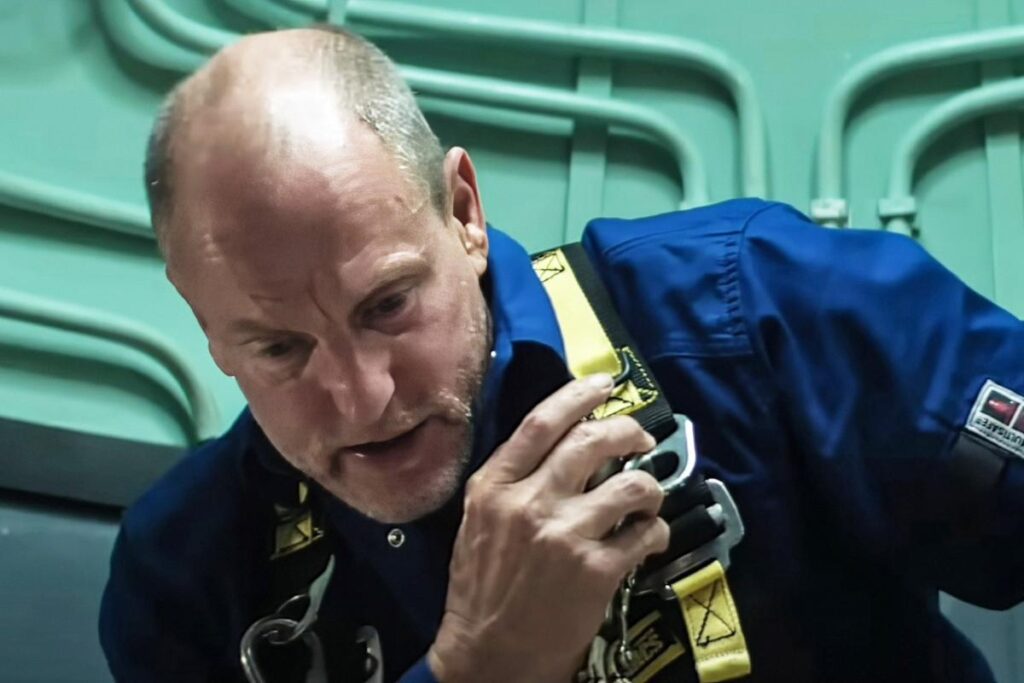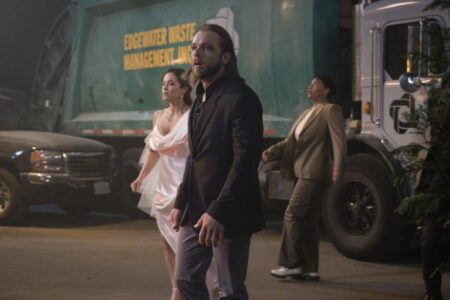Last Breath (now streaming on Peacock) is about as Dad as Dad Movies get: A true story about men doing dangerous things, overcoming adversity and hugging each other in backslappy manner with muscular arms when they’re all done. It also belongs to a rare sub-sub-subgenre, a BOATS (Based On A True Story) movie with actual boats in it, and since it also features a submarine, that makes it a member of a SUB-sub-sub-subgenre. And at the same time, the film straddles another subgenre, the documentary-turned-fiction movie, with director Alex Parkinson taking his 2019 documentary of the same name and dramatizing it, casting Woody Harrelson, Simu Liu and Finn Cole (of Peaky Blinders and Animal Kingdom) as deep-sea divers who find themselves in an extraordinary life-or-death predicament that’s prime Dad Movie fodder.
LAST BREATH: STREAM IT OR SKIP IT?
The Gist: Part of the reason some of y’all have cozy homes with lights and heat has to do with the many miles of submerged gas and oil pipelines sprawled on the ocean floor. And you better appreciate that coziness, because those things are a gigantic pain in the ass to maintain, requiring “saturation divers” to venture into the briny deeps at great personal risk – “one of the most dangerous jobs on Earth,” as an opening title card tells us. Now we meet Chris Lemons (Cole), a newbie diver about to do the living crap out of that dangerous job, which requires days of isolation in an aluminum capsule with two other dudes so their bodies can adjust to deep-sea pressure before they don complex dive suits and grab wrenches and get to tightening the bolts on industrial equipment 300 feet below the surface, and yes, all of this is a silent scream of an argument for finding better energy sources to keep our cappuccino machines and Nintendos humming consistently.
I digress. Before leaving for his 28-day adventure on the North Sea, Chris tells his worried fiancee Morag (Bobby Rainsbury), “Remember, it’s like going into space, but underwater.” Anybody else find that not at all reassuring, just like Morag? Chris is in good hands, though – he’ll be under the supervision of Duncan (Harrelson), an old-timer diving vet who’s on his last rotation after being pressured to retire, and a sweetheart of a tough guy who doesn’t adhere to the grizzled-seafarer stereotype, and you can tell because his big floppy cable knit sweater doesn’t have any holes in it. Duncan will hang out in a diving bell, supervising the mission of his two divers, Chris and Dave (Liu), a strong, silent, grumpy type with a coupla kids at home, about whom he seems willing to share absolutely nothing lest he come off as minimally personable.
And so it was a dark and stormy night, the kind of night that positively oozes with ominous portent, and you’ll surely remember there’s rarely any other kind of portent. Things go poorly when our guys are at their most vulnerable – the ship’s computers go blooey, and the roiling seas pull it off course, tugging the attached diving bell out of position, and therefore yanking Chris and Dave hither and yon by their “umbilical” cables. Chris’ cable snaps, leaving him stranded at the bottom of the ocean with only a few minutes of auxiliary oxygen. Up in the command center is the captain (Cliff Curtis) and his first mate (MyAnna Buring), who have to manually pilot the ship in treacherous waters; the dive supervisor (Mark Bonnar) who grabs remote control of the camera-bearing submarine from his subordinate (Connor Reed) so they can find Chris; and the tech guy (Josef Altin), who dashes to the server room to rewire the ship’s controls. A subtitle counts down the minutes until Chris’ oxygen runs out – then it flips to counting up, tick-tocking the time he’s down there with no air at all to breathe.
What Movies Will It Remind You Of?: Jude Law thriller Black Sea had a similar diving-bell premise, and Mark Wahlberg BOATS thriller Deepwater Horizon has similar ripped-from-the-headlines blue-collar Dad Movie energy. And as far as movies that justified their existence despite being reiterations of excellent documentaries go, Last Breath is similar to Ron Howard’s Thirteen Lives (a dramatization of the rescue of a Thai soccer team from a flooded cave system, via directors Jimmy Chin and Elizabeth Chai Vasarhelyi’s doc The Rescue) and Werner Herzog’s Rescue Dawn (about a Vietnam War fighter pilot’s survival story, based on Herzog’s doc Little Dieter Needs to Fly).
Performance Worth Watching: Bonnar gives the most convincing and understated emotional performance in the inevitably underappreciated role of Stressed Out Guy Sitting Helpless In Front Of A Computer. Notably, he does more with less than the awkward material handed to Harrelson, whose clunky emoting is the product of an underdeveloped and underwritten script.
Memorable Dialogue: Don’t ever give up hope:
Dave: It’s a body recovery now.
Duncan: No it’s not.
Sex and Skin: None.
Our Take: Rock-solid as this six-point-eight-outta-ten movie can be, we can’t ignore the nagging sense that the more compelling elements of this story occur after the credits roll and all participants have to deal with the aftermath of its high-tension, brink-of-death events. No spoilers here (even though the documentary dates to 2019, and the actual events to 2012), but the philosophical and psychological what now of the situation presents questions with difficult-to-ascertain answers, or no answers at all. Ironically, the denouement features the best-written and -performed moments in the film, cracking open all kinds of fascinating dramatic avenues for these characters to explore. But that’s where the movie ends, delivering snippets of real-life footage and text-on-screen postscripts that are cliches of the BOATS genre – and our deep-sigh response warms our hearts as much as it reflects our discontent with the filmmakers’ lost opportunity to make a better, richer movie.
But that would defy expectations, and Last Breath primarily exists to fulfill them. And so we must review the film that is, not the one that could have been – and the film is certainly agreeable in its performances, technical execution and ability to stir a little bit of fraught suspense that inspires an equal amount of cathartic release. Parkinson’s visual language, modulated to optimize tension throughout a refreshingly concise 93-minute run time, compensates for the screenplay’s stylelessness, which is so boilerplate, you’ll want to mend any holes in the ship with it. As a tribute to the highly specialized-skilled blue-collar type guys doing the someone’s-gotta-do-’em dirty jobs, it’s no-nonsense functional. That’s not overly exciting, but probably apt, as they might not want it any other way.
Our Call: Six-point-eight Regular Movie rating, eight-point-oh Dad Movie rating. STREAM IT.
John Serba is a freelance writer and film critic based in Grand Rapids, Michigan.
Read the full article here








